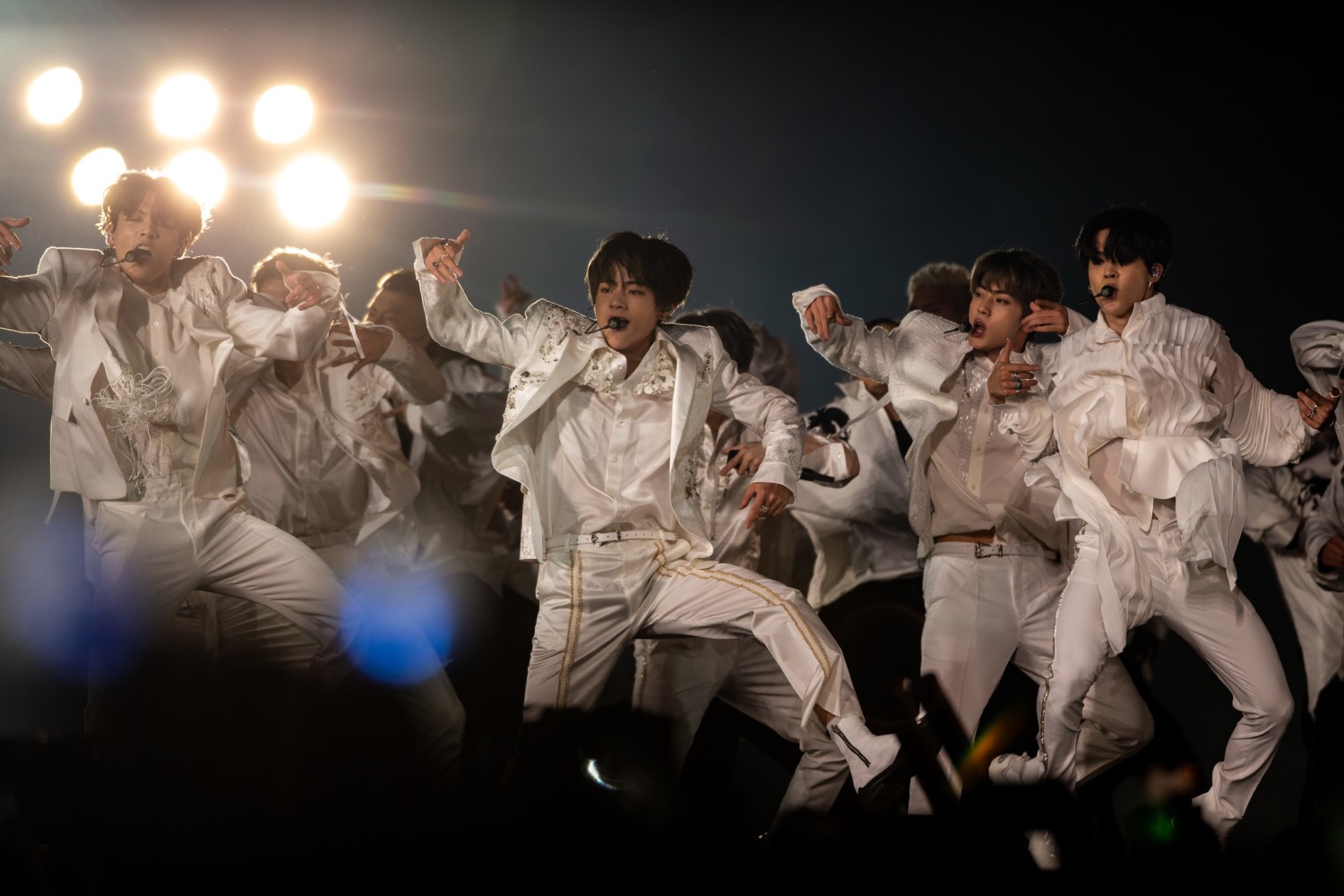BTS performing at the Rose Bowl in 2019
Photo Credit: Tribune Content Agency
We live in an age of impressive technological advancements, but there are many potential dangers to our constant exposure to media. For those of us whose phones have grown into extra appendages, I urge you to be mindful of forming parasocial relationships.
Parasocial relationships occur when an audience member becomes overly attached to a celebrity and forms an imaginary connection with them. As our technology evolves, it only creates more opportunities for parasocial fans.
Practically everything we enjoy is now digitized. Our music is now stored in a virtual library, our favorite films go straight to streaming services, writers hoping to release the Next Great American Novel turn to eBooks, and we’ve successfully created profitable careers based online in the form of live streamers and the more general “influencers.”
Younger generations have grown up with more access to information than ever before. Anything they could find in real life, they can find online cheaper, quicker, and more saturated. Their safe spaces aren’t in the world around them; they’re on the World Wide Web.
But that in and of itself isn’t an issue. For centuries, trends have changed in every generation to reflect technological developments. Are the arcade cabinets of the 80s not a larger, much less portable version of the Xbox?
The problem occurs when interest morphs into dependency or delusion.
Again, this is nothing new. Look up footage of concerts during the era of Beatlemania. Do some research on groupie culture. For as long as we’ve had fandoms, we’ve had parasocial fans.
However, the obsessive nature of fan-artist relationships has only gotten worse with time.
It’s one thing for a teenage girl in the 60s to think Paul McCartney was a heartthrob. It’s another to use social media as a platform to send death threats, dox, or cyberbully someone for not stanning your fave celebrity.
We can’t continue normalizing this behavior. At what point can we separate Taylor Swift fans from Swifties? Where do you draw the line between BTS fans and members of the A.R.M.Y? Did you watch “Glee” or were you a full-blown Gleek?
The online age has given impressionable young children a dangerous new way to identify with the material they consume. These fandom names cultivate a sense of community, but they also promote a sense of conflict between groups.
There are teenagers online getting into wholehearted arguments over hypothetical confrontations between their favorite singers. Additionally, If artists are actually in a public conflict, X (formerly known as Twitter) turns into a battlefield where a 14-year-old will fully believe they are defending someone they know and love.
For hardcore fans, they start to think of the celebrities they endorse as friends or even family. That imaginary link pushes them to test the boundaries of fan-artist relationships, usually for the worse. Nowadays, people who find fame will inevitably find their privacy compromised.
Paparazzi pictures are zoomed in, cropped, exposure brightened, contrast increased, and color corrected just to try and guess what a celebrity’s phone lock screen is. Song demos are leaked and spread like wildfire as viral TikTok audios. Your diet, wardrobe, and surface-level behavior are dissected in hopes of getting a small glimpse into your personal life.
If you’re in a relationship, you’re speculated to be secretly engaged or pregnant. If you end a relationship, there must have been an unforgivable betrayal or cheating scandal. A celebrity “power couple” will announce their divorce, and you’ll have hordes of people claiming they no longer believe in love– and they’re serious!
There’s nothing wrong with being a fan and enjoying someone’s work, but it’s imperative that you keep boundaries in place and remind yourself that these are real people who are entitled to personal lives away from prying eyes.
Parasocial fans will oftentimes find themselves completely detached from reality. They become emotionally dependent on their idols and view them not as people but as almost Godly figures.
If you’re reading this and growing indignant, hold yourself accountable. Having empathy for a performer is a far cry from feeling psychologically disturbed over basic criticism of their work.
On the other hand, I think it’s totally justified to call out people who cross the line from fair critique to baseless or inappropriate judgment.
There are lots of people who hate Taylor Swift just because she’s popular at the moment. There are some who hated her in middle school and never grew out of it. There are even those who have never listened to a Taylor Swift song in their life, but they’ve let their opinion of her be formed by the negative press she’s gotten over the years.
Additionally, any argument based solely on her looks, gender, or private relationships falls out of the bounds of fair criticism.
That being said, it’s vital to remind yourself that someone not enjoying your favorite music is not a personal attack on you or the artist. Everyone has different music tastes, and that’s a beautiful thing!
I’m a big fan of Taylor Swift’s music, but I don’t gasp and clutch my pearls if my friends don’t like a song I play. Because at the end of the day, everyone is entitled to their personal opinions, and everyone deserves to be respected.
On a final note: I am not Taylor Swift’s friend. She has no idea who I am, and that’s okay. In fact, that’s how it’s supposed to be.
Repeat that to yourself, replacing the name with whatever musician, actor, writer, etc. you like best. Use it as a mantra to stop yourself from creating this one-sided delusion of a relationship.
Correction: The photo caption was updated on January 9th, 2024 to include additional information about the location of BTS’ performance.

